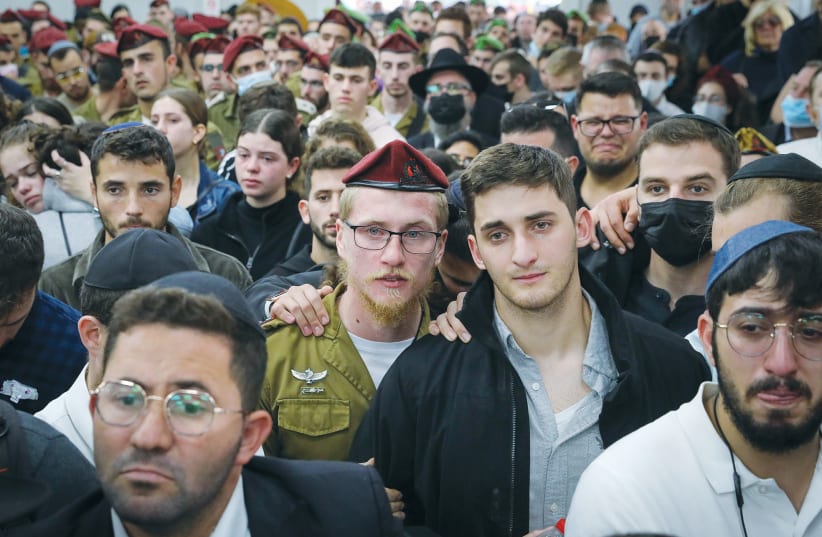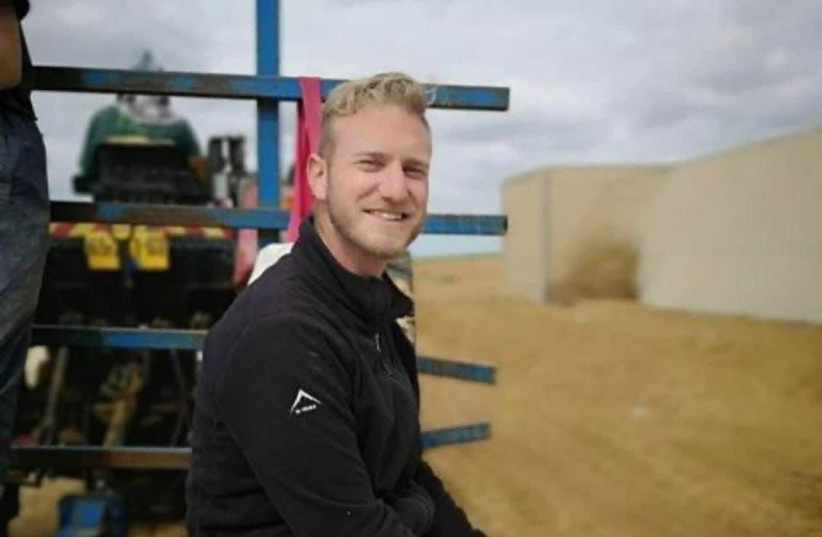I didn’t know Eli Kay, who was killed by a Hamas-affiliated terrorist on Sunday, but his murder touched me as it touched millions of others.
Eliyahu David Kay, called simply Eli by his friends and family, was an unsung hero whose life and qualities were unknown to the broader public until he was horrifically shot down in a narrow street in Jerusalem’s Old City. Kay, 26, was on his way to the Kotel where he worked as a guide for the Western Wall Heritage Foundation. The terrorist, Fadi Abu Shkhaydam, a 42-year-old father of five, was an Islamic preacher and teacher of Sharia. He did not choose Kay and the four other people wounded in the attack randomly. He opened fire on men who were clearly identifiable as Jews. He wanted to kill them just for being Jews.
As the tributes poured in, it became evermore evident that Kay was a special person. He had achieved so much and influenced so many in his tragically short life. The sense of loss was overwhelming. Kay will not get married, as he was planning to do; he will not raise children, or continue in person to contribute to the country and people he so loved.
Born in South Africa, Kay moved to Israel from Johannesburg in 2016 to study at a yeshiva before volunteering to serve in the IDF Paratroopers Brigade, where he overcame several injuries and hardships. He worked for a while on Kibbutz Nirim on the Gaza border and lived on Kibbutz Be’erot Yitzhak. A man of both the Heaven and Earth and a Zionist in the truest sense.
As a “lone soldier” Kay served as a role model for acquaintances, friends and family. His parents, Avi and Devorah, and his siblings followed his lead and also came to live in Israel.
All who knew him spoke of his love of life here. And his love of helping others. Friends wasted no time in arranging special acts of kindness in his memory, handing out Hanukkah donuts to security forces, for example.
THE DAY after the deadly terror attack, the Shin Bet (Israel Security Agency) revealed that it had uncovered a massive Hamas terrorist network. Some 50 cell members were arrested in the joint operation by the agency, IDF and police. According to the Shin Bet, large quantities of weapons and enough explosive materials to make several suicide belts were seized. The publication of the operation was likely influenced by the attack in Jerusalem but it had been carried out over a long period. A soldier and an officer from the elite Duvdevan unit were injured by friendly fire during a complicated arrest of members of the terror cell in September. The network was funded and led by Hamas Political Bureau Deputy Chairman Saleh al-Arouri, who lives in Turkey and as one of the founders of Hamas’s “military wing,” the Izzadin al-Qassam Brigades, has been responsible for the loss of many innocent lives.
The Meir Amit Intelligence and Terrorism Information Center describes Arouri as a key figure in forming ties between Hamas and Iran and Hezbollah. Terrorist tentacles spread far and deep. Terror networks need funds and a means of recruitment. That’s why Britain’s decision to define Hamas’s “political wing” as a terrorist organization – and not just its “military wing” – is so welcome as is a similar decision by Australia to designate Hezbollah in its entirety as a terrorist entity.
It is absurd to pretend that there is a difference between the “political” and “military” activities of organizations whose terrorists cause death and suffering around the world. Terrorism cannot be tackled in halves, with artificial distinctions between “political” and “military” wings, as if one half was comprised of intellectual do-gooders. The rise in Islamist terror attacks around the world demonstrates why this should not be an Israeli concern alone. Terrorism is not about “settlements” and poverty. Abu Shkhaydam, by the way, was a Palestinian “refugee” who lived in a Jerusalem neighborhood and owned property abroad.
Jihadi extremists aim at anyone, of any religion, who doesn’t precisely fit their own twisted school of thought. That’s why major cities in Europe, North America and elsewhere are all potential targets. As talks on the Iranian nuclear deal resume next week, the parties would do well to keep this in mind. Not only Iranian atomic aspirations need to be addressed but also Iran’s funding and arming of terrorist organizations.
LAST WEEK, the Oknins, bus drivers Natali and Mordi, experienced what they described as “our own private Hanukkah miracle” when they were released after eight days in Turkish jails and flown home to be reunited with their families. The espionage charges they faced for taking tourist photos of the presidential palace were dropped. Although, as The Jerusalem Post’s Herb Keinon and Seth J. Frantzman pointed out, the habit of hostage-taking diplomacy by Turkey’s President Recep Tayyip Erdogan, the Iranian regime and others needs to be condemned.
Someone who must have been extra happy with the timing of the Oknins’ release is Defense Minister Benny Gantz. The news and footage of their homecoming helped divert the spotlight from what should have been a much bigger story. Oren Goren, a longtime cleaner in Gantz’s home, had allegedly contacted the Black Shadow hacker group, with reputed ties to Iran, and offered them classified material and to install a virus on the defense minister’s computer.
The Shin Bet reportedly caught Goren before he could do any major harm, but obviously the fact the he had access to Gantz’s home raises major questions considering he had a criminal record including four stints in jail. Reportedly, he did not undergo a serious vetting process because he was already employed there before Gantz was appointed a minister. The fact that Gantz as a former IDF chief of staff should have checked the credentials of his cleaner has also been played down. Had the rotation agreement with Benjamin Netanyahu in the former government taken place, Gantz would today have been prime minister and definitely a prime target for Iranian espionage. Iran, not incidentally, hacked Gantz’s phone a couple of years ago, which should have made him more on guard.
Sometimes you have to wonder how foul-ups that are so big manage to remain undetected for so long. Israel is proud that its intelligence service was able to lift Iran’s entire nuclear records from a warehouse in Tehran and get them safely to Tel Aviv and has reportedly successfully carried out major creative operations to thwart, or at least stall, the nuclear dreams of the ayatollahs. You’d think that something as elementary as checking who is being employed in the defense minister’s home wouldn’t be beyond them. Especially as the information was available via nothing more sophisticated than a Google search.
Truth can be stranger than fiction, but fiction was a consolation this week. The Israeli series Tehran, distributed overseas by Apple TV, won an International Emmy for Best Drama. The compelling story centers around Mossad agent Tamar Rabinyan, working undercover in the Iranian capital in an effort to use her cyber skills to thwart Iran’s nuclear program. I was hooked on it. The portrait of the lives of brave Iranian dissidents was a fascinating bonus. It was good to show the human side of life in Iran, without portraying all characters as irredeemably evil.
Whatever happens next week, the most miraculous story will be an ancient one: The Hanukkah holiday, which starts Sunday night, celebrates the Hasmonean victory over the Syrian-Greek Seleucids in the second century BCE; the rededication of the Temple in Jerusalem; and how the one cruse of untainted oil lasted eight days to keep the menorah in the Temple alight. It’s one of those Jewish holidays that can be summed up as “They tried to kill us, we survived. Let’s eat.” (In this case, the food is oily donuts, latkes and sfenj.) It’s a reminder of the type of Jewish ties to Jerusalem that Hamas wants to erase.
May Eli Kay’s memory be blessed and may his legacy of doing good deeds live on. That is the true conquering spirit.
liat@jpost.com

